- Home
- Brian Falkner
Task Force Page 12
Task Force Read online
Page 12
Huzfa shook his head. “I don’t know the name of it. Not far from here. Down by the river.”
The river! Images of great metal river monsters flashed through her head, and it all came flooding back.
“What time is it?” Kriz asked.
Huzfa pointed to a clock on the wall. “You were unconscious nearly five hours.”
“Get me a phone,” Kriz said, and the croakiness in her voice was gone.
“You need to rest—” Huzfa began, but Kriz cut him off.
“Get me a phone,” she said, and outlined several very unpleasant things that would happen to him if he didn’t obey.
“While we’re waiting, everybody renourish and rehydrate,” Chisnall said.
“Breakfast!” Monster said.
“I don’t know how you can eat in the middle of all this,” Barnard said.
“Is most important meal of day,” Monster said.
“Might be your last meal—better make it count,” Price said.
“Nice. Now I’m not hungry either,” the Tsar said.
“You’re no use to me if you die of starvation,” Chisnall said.
“And I thought it was new weapons and better tactics that were going to win this war,” the Tsar said. “Turns out it’s cornflakes and tinned fruit.”
“Be happy it’s not Puke food,” Price said. “Green sludge in a toothpaste tube. Once we break off from the main task force, that’s all we’ll be allowed to eat.”
“And they’re all vegetarians!” Wilton said.
“What’s wrong with that?” Barnard said. “The Pukes don’t believe in going around slaughtering and eating the other inhabitants of their planet.”
“Except us,” Price said.
“They don’t eat us,” Barnard said.
“Not yet,” Wilton said.
“What’s the difference between eating beef and eating broccoli?” the Tsar asked. “They’re both living creatures when you think about it.”
“Cows don’t want to die,” Barnard said. “Broccoli doesn’t care.”
“How do you know that broccoli doesn’t care?” Wilton asked.
“Cow taste good,” Monster said, licking his lips.
Soft footsteps came from behind Chisnall and he looked around as two German Kommandos Spezialkrafte approached, dark and dangerous in their black uniforms. More of the Kommandos appeared from the riverbank.
“Anything?” one of the Kommandos asked. He was a tough-looking captain, about thirty years old and unshaven.
“Dead quiet so far,” Chisnall said.
“Okay, thanks.”
“What’s going on at the river?” Chisnall asked.
“Problems with the ramps,” the Kommando captain said. “The rain has softened the banks of the river. The engineers have managed to rig something, but it is slow work.”
The Kommando captain set about deploying his squad, in much the same locations as the Angels and Demons had been using.
“We’ve been relieved,” Chisnall said on the comm. “Meet me by the railway tracks.”
Chisnall heard a quiet conversation between Barnard and the Kommando captain, in German, but he could not understand what was said. They seemed to know each other. The discussion was brief and somber.
The captain moved on and Chisnall motioned to his team to gather around.
“From here on the mission is very”—he stopped, searching for the right word—“delicate.”
“We can handle delicate,” the Tsar said.
“This from the master of subtlety,” Barnard said.
The Tsar grinned and poked his tongue out at her.
“Stay focused,” Chisnall said. “We’ve made it this far. Now we need to get to the air base without attracting attention and provide recon until the task force is ready to attack. But they’re running behind schedule, and if anything alerts Amberley Air Base before the task force gets out of the river, then this is going to be a slaughterhouse. Everybody ready?”
“I was born ready,” the Tsar said.
Barnard stuck two fingers near her mouth and pretended to vomit.
“We’re good to go, LT,” Price said.
Chisnall checked the time on his wrist computer. It was nearly 06:00 hours and the sun was well awake.
He stood carefully, trying not to put any pressure on his cracked rib, but despite his efforts, it screamed with pain, and he had to stand still for a moment to clear the swarm of black dots that were circling before his eyes. The others had already moved off, except for Barnard, who was standing beside him, watching him.
“You all right, LT?” she asked.
“I’m okay,” he said.
He switched off his comm while he steadied himself.
“What was that about? With the German guy.”
“The Kommando? Nothing.”
“What did he have to say? Something about the mission?”
“No, he just asked if I was okay,” Barnard said.
“Do you know him?” Chisnall asked.
“Not really,” Barnard said. “I met him briefly on the voyage out.”
Chisnall wondered if it would be prying to ask more. He didn’t get the chance, as Varmint, followed by the rest of the Demon Team, appeared out of the trees.
Varmint got a half smile from Barnard, Chisnall noted. A simple acknowledgment that seemed to conceal something deeper, something unsaid.
They had spent a week on board the HMS Amazon before transferring to the submarine for the last part of the trip. Enough time for Barnard to meet the Kommando. Still, Chisnall couldn’t help the feeling that he wasn’t getting the full story.
Price said she thought Barnard could be trusted. But they had all been fooled before.
He started walking, and despite each step jarring his rib, there was no return of the dizziness.
The Angels were waiting on the other side of the railway tracks. Price was clearly angry with Monster about something, although with the comm off, Chisnall couldn’t tell what it was.
“I don’t know what’s up between those two,” he said as they walked, not sure why he was confiding in Barnard. Maybe it was the painkillers, or maybe he was coming to respect her insight and her rather brutal honesty. “They got on fine at Uluru, but now they can’t stand each other.”
“Jeez, Ryan, is that what you think?” Barnard said. “And you’re a leader of men?”
Chisnall stopped briefly and looked at her. “What do you mean?”
Barnard kept walking. “You figure it out.”
Although there was plenty of room, the Demons crossed the railway line right where the Angels were standing, pushing their way through the assembled group—except for Monster, who was given a wide berth.
“Watch where you’re going, buttwipe,” Price said.
“Aren’t they cute when they’re angry?” Miscreant said.
“Go to hell,” Wilton said.
“We can’t. We got kicked out,” Hooligan said, and turned to Yobbo for a high five.
“Failed the IQ test, probably,” Price said. “Even hell has standards.”
“Obviously Team Angel doesn’t,” Miscreant said.
“What are you still doing here?” Chisnall asked.
Varmint shrugged. “Our MPC with all the demolition charges is stuck somewhere back in that river. You Angels want to fly over there and lift it out for us, we’ll be on our way.”
“Hey, how many Angels does it take to change a lightbulb?” Miscreant asked.
“None,” Yobbo said. “They just watch someone else do it.”
“Yeah, and how many Demons does it take to change a lightbulb?” Wilton asked.
“Only one,” the Tsar said, counting with his middle finger.
“Nope, none,” Miscreant said. “Demons aren’t afraid of the dark.”
13. ULURU
[0600 hours local time]
[Uluru Military Base, New Bzadia]
THE INCOMING CALL INTERRUPTED THE PEACE OF THE ROOM.
The communications
and control room at Uluru was a large dome, featureless except for the video screens that ringed the room at head height. Twenty-six circular desks were scattered across the floor of the dome in a pattern, which although seemingly random, was optimized for maximum efficiency when all the desks were occupied. That would only be in the event of a major alert or incident, however, and currently only three of the desks had operators at them, all of whom looked bored.
It was nearly shift change, and it had been a long, uneventful night, like all nights. At least, since that night.
There were four staff on duty altogether. The fourth was the shift commander, sitting at his desk on a raised circular platform in the center of the room.
He had one leg propped on a second chair, although that did little to relieve the aching. Most of the bones in his body had been shattered when the humans had attacked Uluru, but that leg had been the worst.
The incoming call lit up screens all around the room. While probably nothing, it was at least an interruption of the monotony.
All three of the operators reached for the call, but the young female, Ibazu, was quickest.
The shift commander could see her face from his vantage point and tried to gauge from her expression whether it was anything to warrant him shifting his leg from where it rested.
Confusion was what he saw, rather than alarm.
He sent a message to Ibazu’s console. Put it up.
She glanced up at him, spoke briefly to the caller for a few more seconds, then punched the call up onto the loudspeakers.
“I am Lieutenant Yozi Gonzale,” the shift commander said.
A female voice, thick, barely more than a mumble, responded. “I am Major Zara Kriz,” she said, and began to talk. Yozi listened, and as he did, his still-healing leg came down off the chair. He leaned forward at his desk, the pain forgotten.
Even while Kriz was groggily spouting nonsense about river monsters and scumbugz, he was sending another message to Ibazu’s console.
Contact the regional patrol base. I want a scan of the river immediately.
Ibazu picked up her phone.
The patrol base was located at the old Brisbane Airport at the mouth of the river. A sweep of the river, from the base, along to Ipswich would take the rotorcraft approximately fifteen minutes.
The race for Amberley had begun.
The Angels moved softly through a waking city, avoiding anyone they could and casually greeting anyone they could not avoid.
One elderly Bzadian, agitated at the sight of armed troops in his quiet suburban street, came out of his house and protested. Chisnall and Monster took him back inside and, after checking the house for other residents, gave him a shot of Puke spray. Rheumy eyes filled with spite followed them as they locked the front door and left.
They were well out in the suburbs now. Little houses on individual plots lined up in neat rows on neat streets. To the human eye, the yards of the houses were unkempt and overgrown. Lawns were not mowed, hedges were untrimmed, and some houses seemed on the verge of being overrun by the greenery around them. That was the Bzadian way, Chisnall knew. They lived more in harmony with the natural world than humans did, and felt less need to cut, slash, tidy and prettify the living things around them.
He kept one ear on the task force radio channel. It was distracting, listening to all the comms chatter, but he wanted to know about their progress.
He checked their own position. They were almost at Amberley. They had made good time.
One more turn took them into a dead-end street, leaving the asphalt and moving onto farmland, overgrown and wild. Their T-boards pushed through long grasses, which sprang back behind them. A couple of fences blocked their way, but they were for cattle and easily climbed over. The team entered a small forest and stopped just inside the far edge, looking down from a slight rise to the flat plain beyond, where the buildings of Amberley Air Base sat silent, a sleeping giant they did not want to wake.
Two runways created a huge cross that pointed to the south. At the northern end, large hangars rose up against the early-morning light.
Lining the runway to the north were row after row of fast movers. There were at least fifty or sixty Type Ones, the small nimble jets that were so dangerous to human aircraft. In neat diagonal rows behind those were the Type Twos, air-to-ground attack craft, and on two flat tarmac areas to the north of that were the Dragons, the huge, formidable castles of the air, bristling with armaments and almost invulnerable to attack.
A few Bzadians were moving around the airfield, and a security patrol in a Land Rover was following the perimeter fence line, but it was otherwise quiet.
“Task Force Actual, this is Angel One,” Chisnall said.
“Task Force Actual, clear copy,” came the reply.
“We have eyes on Target Bravo, all clear, all quiet,” Chisnall said.
“Solid copy, Angel One. We are waiting for a rotorcraft to pass by. Might be heading to the air base. Make sure you stay out of sight.”
“Solid copy, Task Force Actual. We’ll sit nice and tight.”
They kept good cover behind the trees and waited.
“Big Dog,” the Tsar said a few moments later. “Got that slow mover on the scope. Looks like it’s coming right this way.”
“ETA?” Chisnall asked.
“About four minutes.”
“I’ve got a bad feeling about this,” Wilton said.
So did Chisnall, but he was careful not to share it.
Kriz made it back to the Coastal Defense Command Center in time to see the rotorcraft arrive at Ipswich.
It was only a few minutes’ drive from the hospital, and the ambulance that took her must have broken some kind of record, lights flashing and siren screaming despite the fact that the roads were almost deserted.
If she woke up a few residents, tough.
The ambulance attendant went with her into the command center, holding her arm. She was grateful, because otherwise she would have fallen.
As she sank into her chair, the screens were already full of the images from the high-resolution night-vision camera mounted on the underside of the patrol craft.
“Anything?” she asked.
Nanzi, who had been manning Kriz’s desk, shook his head. “It’s been completely clear,” he said.
“What about the mist on the river?” Kriz asked.
“Gradually clearing,” Nanzi said. “But thermal imaging has been clear also.”
“Who’s the captain of that rotorcraft?” Kriz asked.
“Lieutenant Zzaker,” Nanzi said, referring to a screen.
“Get her on the line now,” Kriz said.
The voice came through her headset within a few seconds.
“Where are you now?” Kriz demanded, with no time for formalities.
“We’re on the Bremer River,” Zzaker said. She was young, judging by her voice. “Over North Ipswich, just following the curve of the river around to the mall.”
“Still all clear?” Kriz asked, although she could see on the screens that it was.
“Yes, so far and … Wait a second.”
Kriz found her attention drawn to the speaker box on the wall, not the video screen.
“There may be some kind of activity up ahead, opposite the mall,” Zzaker said. “Just coming into range now. There’s something in the river too. I’m going in for a closer look.”
“No!” Kriz yelled, but she was far too late.
The video feed came into focus: the soldiers scurrying around on the shore; the vehicles starting to line up in the adjacent parking lot; the long line of vehicles still semisubmerged in the river.
“Full alert!” Kriz yelled at Nanzi. To the speaker on the wall she shouted, “Get out of there!”
A bright star blossomed in the middle of the video screen, growing larger and larger.
Zzaker’s voice on the radio, no longer directed at Kriz: “Incoming! Countermeasures! Evasive maneuvers.”
The image on the screen s
wung wildly as the gimbal-mounted cameras struggled to cope with the violent movements of the aircraft. The bright dot grew, drawing a fiery pattern in the middle of the screen. It filled the screen just before it all went blank.
Half a second later they heard the thunderclap of sound, rattling the windows of the command center.
“Who do I call?” Nanzi cried.
“Everyone,” Kriz said distantly.
14. STEEL ON TARGET
[0620 hours Local time]
[Amberley Air Base, New Bzadia]
“THIS VERY NOT GOOD,” MONSTER SAID.
They were still on the eastern slope of the small wooded hill, on the ridgeline, with a clear view of the huge Amberley Air Base slumbering away below them.
But now, the awakening of the air base was as dramatic as it was sudden.
Floodlights blared into life. The runways became great glowing strips. The hangar doors began to open. At the barracks, transportation vehicles were starting up, ready to bring pilots and ground crews to the waiting rows of jets and rotorcraft.
Chisnall felt bile rise into his throat as he realized what that meant for the men and women of the task force, stuck back at the river.
“Angel One to Task Force Actual,” Chisnall said. “Major activity at Target Bravo. I repeat, major activity at Target Bravo.”
“Solid copy, Angel One.” It was Colonel Fairbrother, the task force commander. A gray-haired marine, about fifty years old, he had served in the British Army until its remains had been absorbed into the US Army and Marine Corps. Regarded by some as a brilliant commander and by others (mostly Americans) as an eccentric, he was renowned for wearing a sword into battle. Actually, it was a cavalry sabre, and it was not merely ceremonial. According to legend, he had used it on more than one occasion.
Fairbrother said, “We knew this would happen sooner or later. Now let’s get those bloody vehicles out of that bloody river before the entire bloody Bzadian air force gets here.”
“There’s no time,” Price said, her eyes fixed on the airfield. “Those first fast movers will be off the ground within five mikes.”
“Task Force Actual, anticipate enemy aerial activity, your sector, five mikes,” Chisnall said.

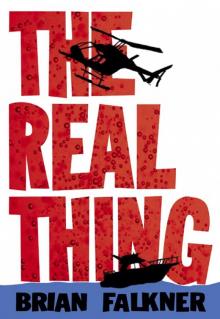 The Real Thing
The Real Thing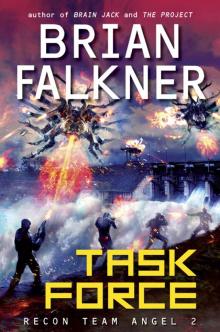 Task Force
Task Force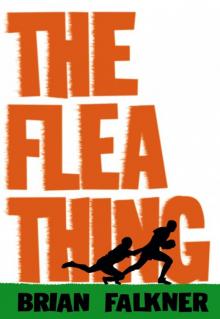 The Flea Thing
The Flea Thing The Project
The Project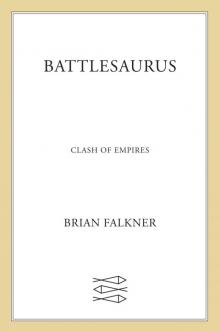 Clash of Empires
Clash of Empires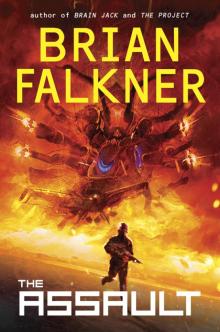 The Assault
The Assault Brain Jack
Brain Jack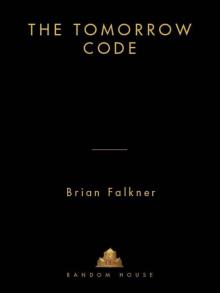 The Tomorrow Code
The Tomorrow Code Vengeance
Vengeance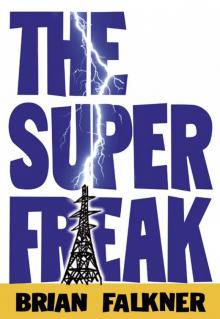 The Super Freak
The Super Freak Northwood
Northwood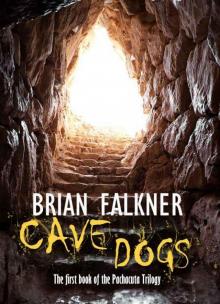 Cave Dogs (Pachacuta Book 1)
Cave Dogs (Pachacuta Book 1)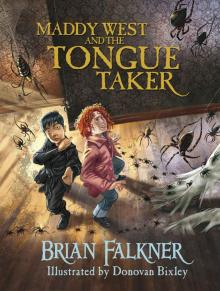 Maddy West and the Tongue Taker
Maddy West and the Tongue Taker